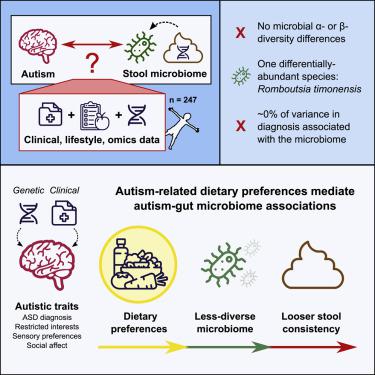Cell ( IF 45.5 ) Pub Date : 2021-11-11 , DOI: 10.1016/j.cell.2021.10.015 Chloe X Yap 1 , Anjali K Henders 2 , Gail A Alvares 3 , David L A Wood 4 , Lutz Krause 4 , Gene W Tyson 5 , Restuadi Restuadi 6 , Leanne Wallace 2 , Tiana McLaren 2 , Narelle K Hansell 7 , Dominique Cleary 3 , Rachel Grove 8 , Claire Hafekost 3 , Alexis Harun 3 , Helen Holdsworth 9 , Rachel Jellett 10 , Feroza Khan 11 , Lauren P Lawson 10 , Jodie Leslie 3 , Mira Levis Frenk 9 , Anne Masi 11 , Nisha E Mathew 11 , Melanie Muniandy 10 , Michaela Nothard 9 , Jessica L Miller 7 , Lorelle Nunn 6 , Gerald Holtmann 12 , Lachlan T Strike 7 , Greig I de Zubicaray 13 , Paul M Thompson 14 , Katie L McMahon 15 , Margaret J Wright 16 , Peter M Visscher 6 , Paul A Dawson 17 , Cheryl Dissanayake 10 , Valsamma Eapen 18 , Helen S Heussler 19 , Allan F McRae 6 , Andrew J O Whitehouse 3 , Naomi R Wray 20 , Jacob Gratten 1

|
There is increasing interest in the potential contribution of the gut microbiome to autism spectrum disorder (ASD). However, previous studies have been underpowered and have not been designed to address potential confounding factors in a comprehensive way. We performed a large autism stool metagenomics study (n = 247) based on participants from the Australian Autism Biobank and the Queensland Twin Adolescent Brain project. We found negligible direct associations between ASD diagnosis and the gut microbiome. Instead, our data support a model whereby ASD-related restricted interests are associated with less-diverse diet, and in turn reduced microbial taxonomic diversity and looser stool consistency. In contrast to ASD diagnosis, our dataset was well powered to detect microbiome associations with traits such as age, dietary intake, and stool consistency. Overall, microbiome differences in ASD may reflect dietary preferences that relate to diagnostic features, and we caution against claims that the microbiome has a driving role in ASD.
中文翻译:

与自闭症相关的饮食偏好介导自闭症与肠道微生物组的关联
人们越来越关注肠道微生物组对自闭症谱系障碍 (ASD) 的潜在影响。然而,之前的研究力度不够,也没有旨在全面解决潜在的混杂因素。我们基于澳大利亚自闭症生物库和昆士兰双胞胎青少年大脑项目的参与者进行了一项大型自闭症粪便宏基因组学研究(n = 247)。我们发现 ASD 诊断与肠道微生物组之间的直接关联可以忽略不计。相反,我们的数据支持一个模型,即与自闭症谱系障碍相关的受限兴趣与饮食多样性较低有关,进而减少了微生物分类多样性和较稀的粪便稠度。与 ASD 诊断相比,我们的数据集能够很好地检测微生物组与年龄、饮食摄入量和粪便稠度等特征的关联。总体而言,自闭症谱系障碍中微生物组的差异可能反映了与诊断特征相关的饮食偏好,我们对微生物组在自闭症谱系障碍中具有驱动作用的说法持谨慎态度。











































 京公网安备 11010802027423号
京公网安备 11010802027423号